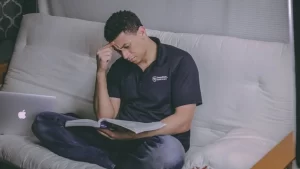Guide to Understanding and Applying for the F1 Visa
A Review of the F1 Visa

The F1 visa is a non-immigrant visa designed especially for overseas students who want to continue their education in the US. For students engaged full-time in a program at an approved U.S. institution—from colleges and universities to language training programs—this visa category is mandatory. A smooth journey to study in the USA depends on knowing the F1 visa requirements and the application procedure.
What is an F1 Visa?
While completing their studies, students can reside in the United States on an F1 visa. The nature of it is unique among other visa categories since it is intended especially for academic use. An F1 student visa allows you to continue your education temporarily rather than leading to permanent residency.
F1 Visa Requirements
To be eligible for an F1 visa, you have to fulfil several essential conditions:
- Acceptance into a Program: You have to be admitted to a full-time academic program at a university that has been approved by SEVP. This covers colleges, universities, high schools, private elementary schools, seminaries, conservatories, and language training courses.
- English Proficiency: You have to show that you can speak the language well or register in classes that will help you do so. For you to be able to successfully go after your studies, this is an essential student visa requirement.
- Financial Evidence: You have to show that you can pay for your education. It covers living expenses, tuition, and other related charges.
- Ties to Home Country: You have to show that, after your studies are over, you plan to return to your home country.
How to Write an F1 Visa Application
There are a few stages to the F1 visa application procedure, and each is essential to the success of your application.
Acceptance and the I-20 Form
Your first step is to get accepted to a school that has been approved by SEVP. Once admitted, the school will give you a Form I-20, which you need to submit with your visa application. A document proving someone is eligible for non-immigrant student status is Form I-20.
Paying the SEVIS Fee
The SEVIS I-901 charge must then be paid. Application fees are required and support the Student and Exchange Visitor Information System (SEVIS).
Finishing Form DS-160
To apply for a non-immigrant visa online, fill out the DS-160 form. Your background, your planned courses, and your financial status will all need to be fully revealed on this form.
Planning the Visa Interview
You must arrange an interview with the U.S. Embassy or Consulate in your native country after finishing the DS-160 form The interview is one of the most crucial phases in the application process.
Getting Ready for the Interview for an F1 Visa
Though it could be stressful, the F1 visa interview can be made easier to handle with careful planning. The consular officer will investigate you throughout the interview to find out about your financial security, your desire to study in the United States, and your links to your nation.
Required Documents
Several papers will be needed for the interview:
- A current passport
- The Form DS-160 confirmation page
- The payment of the visa application fee
- A picture that satisfies the standards for a U.S. visa
- SEVP-approved school’s Form I-20
- Proof of ability to pay living and tuition costs
- Proof of your close connections to your nation
F1 Visa Timeframe and Travel
The F1 visa duration usually equals to the length of your academic program plus an extra sixty days to be ready to leave the country or switch to another program. By following the terms of your stay and keeping in regular contact with your Designated School Official (DSO), you can preserve your visa status.
Travel Restrictions
While they are enrolled in school, students with F1 visas are permitted to go outside of the country; however, they must make sure their visa and Form I-20 are still valid for reentry. Students who want to prevent problems when they return should speak with their DSO before leaving and follow all instructions.
Working on an F1 Visa
Although the main use of the F1 visa is academic, there are certain work possibilities available under particular circumstances.
On-Campus Employment
During the academic year, you are permitted to work up to 20 hours a week on campus; throughout the holidays, you are permitted to work full-time. Further authorization is not needed for this kind of work.
Off-Campus Employment
You need USCIS permission to work off campus. Options include:
- Curriculum Practical Training (CPT): Gives you work experience related to your studies.
- Optional Practical Training (OPT): Up to a year of work experience in a subject connected to your studies. Students obtaining STEM degrees can request an extra 24-month extension.
Transitioning from F1 Visa

You have a few choices for moving on from an F1 visa after you finish your studies:
Optional Practical Training (OPT)
For work experience in your area of study, you can apply for OPT. OPT lasts up to a year, and STEM graduates get an extra 24 months.
Change of Status
You may be qualified to convert to an H-1B visa if you get a job. In addition, based on your situation, you might apply for other visa categories or even permanent residency.
FAQs Concerning the F1 Visa
What is an F1 visa?
An F1 visa is a non-immigrant visa granted to students studying in the United States.
How to Apply for a Student Visa?
Get accepted into a school recognized by SEVP, pick up Form I-20, pay the SEVIS fee, finish the DS-160 form, and show up for a visa interview.
What Criteria Must a Student Visa Meet?
English language proficiency, sound financial standing, admittance into a full-time program, and desire to return home after graduation.
Can an F1 Visa Holder Work?
There are limits on on-campus jobs; off-campus jobs need USCIS permission.
Common Challenges and How to Overcome Them
Challenges with Finance
Showing financial stability is one of the biggest challenges for many students. Be sure you have all the paperwork you need for your interview, including bank statements, support affidavits, and scholarship letters.
Denied Visa Applications
Although denials of visas can be depressing, they do not mean the end of the world. Before reapplying, find out why you were denied and take action to fix it. Typical causes include little financial support, loose educational plans, or weak links to the home country.
Concerns about Travel
It takes careful planning to travel abroad in the United States while holding an F1 visa. Before booking an adventure, make sure your Form I-20 and visa are still valid and speak with your DSO to prevent problems when you try to re-enter.
What Made You Select Passage Law?
The speciality of Passage Law is assisting students in overcoming the complexity of the F1 visa application procedure. Personalized advice and support are offered by our team of skilled immigration lawyers to guarantee an easy and fruitful visa application process. We can assist with your first application, getting ready for your visa interview, or getting work authorization.
Knowledge and Help
Personalized services from Passage Law include:
- Initial Consultation: Determine your eligibility and walk you through the procedure.
- Application Assistance: Assist you in filling up and sending in the required paperwork.
- Interview Preparation: Utilize practice interviews and advice to be ready for your visa interview.
- Continued Support: Help you keep your visa status current and take care of any problems that come up while you’re here.
Consult Passage Law for knowledgeable legal support with your F1 visa application and other immigration requirements. Our committed experts are dedicated to giving students from abroad wishing to study in the US the best legal assistance possible.
Please Get in Touch
Please do not hesitate to contact us if you require help with your visa application or if you have any queries. At every stage of the process, Passage Law is here to help.
